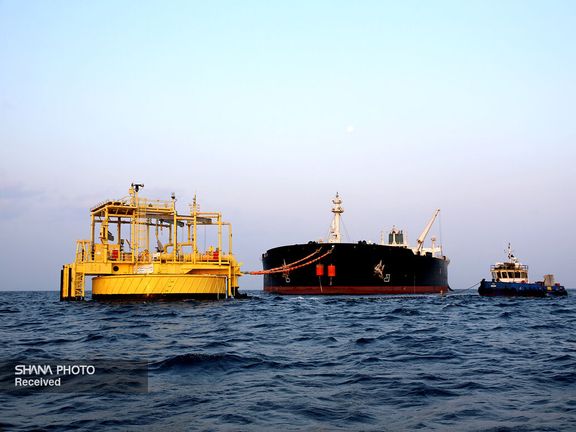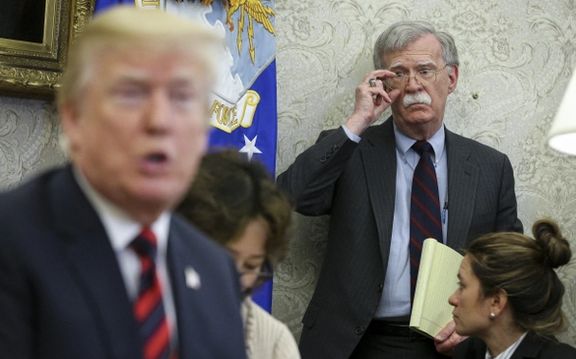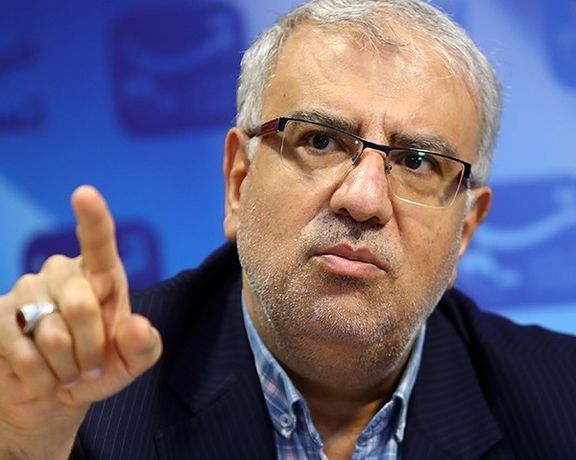Oil Minister Says Iran Foiled Unreported US Attempted Oil Seizures

United States armed forces have been thwarted in several attempts to seize tankers with Iran’s oil, Oil Minister Javad Owji said in an interview published Friday.

United States armed forces have been thwarted in several attempts to seize tankers with Iran’s oil, Oil Minister Javad Owji said in an interview published Friday.
“In only one or two cases the Americans’ acts of aggression against the ships carrying Iranian oil were covered by the media, but several other cases were not,” Owji told Fars News. “Fortunately, the armed forces, especially the IRGC [Revolutionary Guards] Navy, did not allow the enemy to succeed…We took oil to the places the Americans cannot even think of”.
Earlier this month, Associated Press reported the US had seized cargoes of suspected Iranian oil in February as Tehran sought to sidestep US ‘maximum pressure’ sanctions that threaten punitive action against anyone buying Iranian oil. AP said the two tankers had used false documents and repainted the decks.
In past seizures, the US has auctioned the crude, earmarking the proceeds for “victims of terrorism” or ‘administration.’ A January report by the Washington Post looked at ways Iran exports diesel despite US ‘maximum pressure.’
Owji told Fars that Iran had increased lately oil production and income. The Organization of Petroleum Exporting Countries (Opec) confirmed Tuesday that Iran boosted production by 44,000 barrels a day (bpd) in January to 2.55 million bpd in February, fetching an average $93 a barrel, 62 percent up on the 2021 average.
The minister said earlier this month that output could reach its maximum within two months of a revived 2015 nuclear deal and eased US sanctions.

Israel’s prime minister and foreign minister have called on Washington to keep Iran’s Revolutionary Guards on its list of ‘foreign terrorist organizations.’
“The Revolutionary Guards are a terrorist organization that has murdered thousands of people, including Americans,” Naftali Bennett and Yair Lapid said in a statement. “We have a hard time believing that the United States will remove it from the definition of a terrorist organization.”
During negotiations since April 2021 to revive the 2015 nuclear deal, Tehran has made clear it expects the United States to lift a raft of ‘maximum pressure’ sanctions introduced after the Trump administration in 2018 withdrew the US from the deal, the JCPOA (Joint Comprehensive Plan of Action).
There has been speculation that one of the disagreements in not concluding a nuclear deal is over delisting the IRGC. Opponents of the JCPOA in the US and Israel are aware than not delisting the IRGC would make it harder to gain acceptance in Tehran for reimplementing the agreement, which limited Iran’s atomic program.
Shared global mission
The statement from Bennett and Lapid portrayed IRGC designation as part of a “global fight against terrorism…a shared mission of the entire world.” To remove the designation, they said, would mean the US abandoning “its closest allies in exchange for empty promises from terrorists.”
Former United States president Donald Trump added the IRGC to the list in 2019, the first time part of a state’s armed forces was included. Trump’s designation referred specifically to the 1983 bombing of a marine barracks in Lebanon, carried out by a Lebanese Shia group when the US intervened in the Lebanon war after the 1982 Israeli invasion, and the 1996 Khobar Tower bombing in Saudi Arabia, culpability for which has never been conclusively established.

The Israeli statement portrayed the IRGC as controlling a range of groups across the Middle East. “The Iranian Revolutionary Guards are Hezbollah in Lebanon, they are Islamic Jihad in Gaza, they are the Houthis in Yemen, they are the militias in Iraq,” it said.
Promise not to harm Americans
Bennett and Lapid argued against the US listing groups as terrorists only on the grounds of a perceived threat to Americans: “The Revolutionary Guards took part in the murder of hundreds of thousands of Syrian civilians, they destroyed Lebanon, they are engaged in the murderous repression of Iranian civilians. They kill Jews because they are Jews, Christians because they are Christians, and Muslims because they do not surrender to them. We find it hard to believe that the definition of the Revolutionary Guards as a terrorist organization will be abolished in exchange for a ‘promise not to harm the Americans.'”
Not only that, the IRGC, for the Israeli leaders, is an “integral part of the murderous repression machine in Iran” whose “hands are stained with the blood of thousands of Iranians and the trampling of the soul of Iranian society.” Hence, argued Bennett and Lapid, removing the IRGC from the list would be “an insult to the victims and the erasure of a documented reality, with unequivocal evidence.”
Collision course
Reports say the Biden Administration is considering removing the IRGC from its ‘foreign terrorist’ list a part of agreement to revive the JCPOA limiting Iran’s nuclear program. But JCPOA opponents in Israel, the US and elsewhere have highlighted the IRGC recently firing a dozen ballistic missiles at Erbil in northern Iraq after an Israeli airstrike killed two Iranian soldiers in Syria. Iran claimed that it targeted an Israeli intelligence base, but Iraq and the US dismissed the claim.
Following a House Armed Services Committee hearing Thursday, Democrat congresswoman Elaine Luria, a naval veteran, tweeted that reviving the JCPOA would “put Iran and Israel on a collision course,” echoing remarks by Israel’s ambassador to the United States Michael Herzog.

Former US national security adviser John Bolton says restoring the 2015 nuclear deal is a "terrible mistake" and insists the Iranian regime must be overthrown.
Calling the 2015 deal, Joint Comprehensive Plan of Action (JCPOA) a "bad deal," Bolton told Iran International television on Thursday that going back to it is a "terrible mistake for the United States and anyone who believes in peace and regional security."
"The concessions that were made to the mullahs in Tehran to get the deal put back together make it even worse. It was supposed to be about nuclear matters and not about terrorism. If it's about terrorism, there is a lot more to do, to discuss with Iran. But to take the IRGC off the terrorism list I think would be a big mistake," he said, adding that it is the fundamental elements of the deal itself that are bad too.
"That's the real problem," he said, adding that the administration of President Joe Biden is making a "strategic mistake" in seeking to restore the JCPOA. "It's a sign of weakness and lack of strategic vision."
American and Israeli sources told Reuters and Axios that the Biden Administration is considering removing the Revolutionary Guards (IRGC), which was blacklisted by the Trump administration in 2019 as a terrorist organization, in return for a commitment by Iran to "reign in" the guards.
Bolton also referred to the recent Russian demand for US guarantees that its cooperation with Tehran would not be blocked by Ukraine sanctions, criticizing the Biden administration for granting a waiver to Moscow for nuclear work in Iran. He Russia won "one more concession from the Biden administration", and they will continue to have the same role they had in the 2015 deal and perhaps an "expanded role" in the revived agreement. "This gives Russia a legitimacy that it doesn't deserve at this point."
Bolton who has always advocated regime change in Iran sought complete withdrawal from the 2015 nuclear deal with Iran and said the deal was so bad it could not even be fixed. Bolton, Israeli Prime Minister Benjamin Netanyahu and Secretary of State Mike Pompeo in 2019 prevented Trump’s attempts to open diplomatic channels with Iran.
The Iranian regime is "rogue", Bolton said, emphasizing that it must be "overthrown" and "the Iranian people get to have a say who their government is."
Trump did not go along with some of Bolton's major hardline positions such as seeking regime change in Iran and in September 2019, he said on Twitter that he had dismissed him due to the many disagreements between them. Bolton later told the media the president had never asked for his resignation and that he had resigned of his own accord.
Iran on January 8 added Bolton's name to its blacklist of US nationals it accuses of having a role in the decision-making, planning, organizing, financing, directing or carrying out the strike that killed the IRGC Qods Force commander Ghasem Soleimani at Baghdad airport in January 2020.
Earlier this month, the Washington Examiner quoted a Justice Department official as saying that there was enough evidence to indict two IRGC agents who allegedly had plotted to assassinate Bolton but the Biden administration was resisting any public measures for fear that it could derail the Vienna negotiations with Tehran.
Bolton said he could not reveal the details of the alleged assassination plot but considers being sanctioned by Iran, Russia, and China "a badge of honor".

The Biden Administration is considering removing the Revolutionary Guards from its foreign terrorist blacklist in return for unspecified Iranian assurances.
Sources told Axios and Reuters that Washington had not decided what might be an acceptable commitment from Tehran in exchange for such a step, which would reverse former US President Donald Trump's 2019 blacklisting of the group and draw sharp Republican criticism.
The move was the first time Washington had formally labeled part of another sovereign government as a terrorist group.
Iranian officials have been publicly raising the issue since at least November, saying a ‘good deal’ would mean lifting sanctions on the Revolutionary Guard.
The Islamic Revolutionary Guard Corps (IRGC) is a powerful faction in Iran that controls a business empire as well as elite armed and intelligence forces that Washington accuses of carrying out a global terrorist campaign.
A source, who spoke on condition of anonymity with Reuters, said the Biden administration was weighing whether to drop the terrorist designation "in return for some kind of commitment and/or steps by Iran, with respect to regional or other IRGC activities."
The Biden administration's consideration of such a tradeoff was first reported by Axios, citing Israeli and US sources.
Multiple sources have said dropping the designation is one of the last, and most vexing, issues in wider indirect talks on reviving the 2015 deal under which Iran limited its nuclear program in return for relief from economic sanctions.
Both allies such as Israel and domestic opponents of reviving the JCPOA have urged the Biden Administration not to take such a step.
IRGC’s proxies in the region continue attacking US and allied targets. On Sunday, IRGC fired 12 ballistic missiles at Erbil, in Iraq hitting an area near A US consulate building.
Asked about the possibility of removing the IRGC from the US terrorism list, State Department spokesman Ned Price declined comment beyond saying that sanctions relief is at the heart of negotiations to revive the nuclear deal.
Last week an Iranian official said the IRGC's removal from the blacklist had been under discussion as far back as June but that the issue had become more complicated after last summer's election of hardliner Ebrahim Raisi as Iran's president.
The Iranian official, who spoke on condition of anonymity, said the United States had made clear "they cannot remove it without major concessions from Iran," a stance he said had been rejected by Iran's lead nuclear negotiator, Ali Bagheri Kani.
The IRGC's political influence in Iran's complex power structure has increased since the election of Raisi, who took office in August and whose government includes dozens of Revolutionary Guard commanders.
Raisi's election led to a five-month gap in the indirect US-Iranian talks over reviving the nuclear deal, which Trump abandoned in 2018 and reimposed U.S. sanctions, prompting Iran to start violating its nuclear limits about a year later.
Reporting by Reuters

Iran increased oil production and sold at a higher price in February, the Organization of Petroleum Exporting Countries (Opec) announced Tuesday.
In its Monthly Oil Market Report, Opec put the price of Iranian crude sold in February at $93 a barrel, a 9 percent increase on January and a 62 percent increase on the 2021 average of $57.52.
Iran has been steadily increasing oil exports since late 2020 despite US sanctions that officially have remained in place but not enforced sufficiently.
Opec said Iran’s crude production in February rose by 44,000 barrels a day (bpd) from January to 2.546 million barrels, albeit a lower increase than for Saudi Arabia and Libya, whose increased output respectively of 141,000 and 105,000 barrels accounted for most of a rise across Opec countries.
The Opec report put Iran’s average 2021 production at 2.405 million bpd, an increase from 2 million in 2020, but still lower than the 3.8 million before the US imposed ‘maximum pressure’ sanctions in 2018, which threatened punitive action against third parties buying Iranian crude and slashed Iran’s exports.
Oil Minister Javad Owji said earlier this month that output could reach a maximum level within two months of agreement to revive the 2015 nuclear deal and ease US sanctions. Iran has already over 100 million barrels in storage ready to meet demand for its exports.

US seizure of Iranian tankers in recently has not stopped Tehran from increasing oil exports, giving Iran leverage in nuclear talks, the oil minister has said .
“The United States has on several occasions in the past months violated Iranian oil tankers to prevent export of shipments," Javad Owji said in an interview carried by Iranian media.
"When the enemy realized it could not stop our exports and contracts, they went after our ships," Owji said.
The rise had "even increased the bargaining power of friends in Vienna," he said, without elaborating.
His remarks follow reports of a recent seizure of an Iranian oil tanker in the Bahamas, even as indirect Iran-US talks in Vienna to revive a 2015 nuclear deal could see the lifting of sanctions.
A last-minute demand by Russia, a close ally of Iran, has forced world powers meeting in the Austrian capital to pause for an undetermined time, despite having a largely completed text.
On March 5, Russia unexpectedly demanded sweeping guarantees its trade with Iran would not be affected by sanctions imposed on Moscow over its invasion of Ukraine - a demand Western powers say is unacceptable and Washington has said it won't accept.
"Iran's oil exports have risen under the toughest sanctions and without waiting for the outcome of the Vienna talks," said Owji.
The increase was thanks to "different methods used to win contracts and finding different buyers," Owji said.
With reporting by Reuters